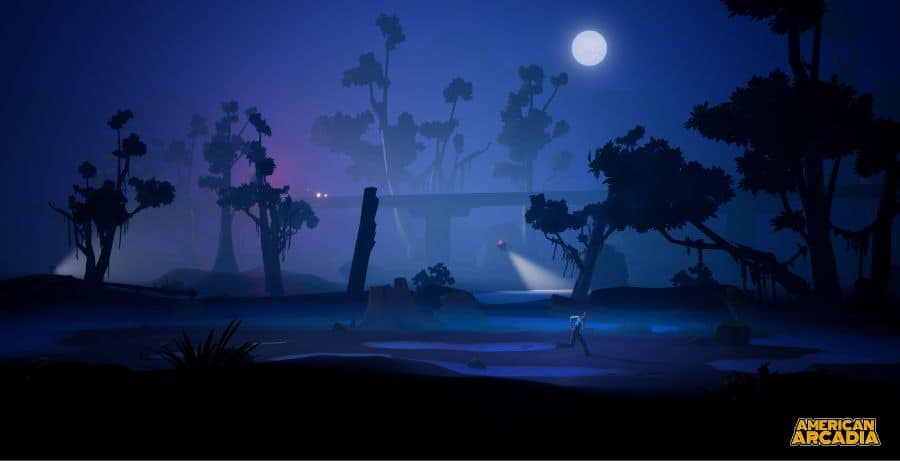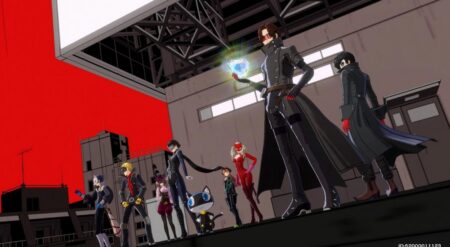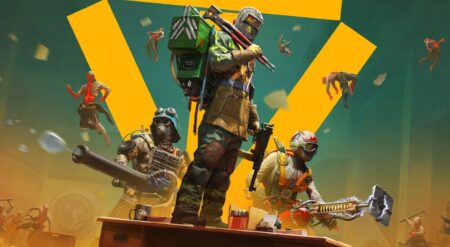Today, EPCOT is known as that Disney theme park where you can drink worldwide and go on a Guardians of the Galaxy ride. But did you know that that wasn’t what Walt Disney envisioned? EPCOT is an acronym, meaning Experimental Prototype Community of Tomorrow, a techno-futuristic city that Walt was in complete control of. All your needs were met with everything being close by. You could travel to other areas of the “ideal city” by the people mover, eliminating the need for cars. The catch was… you had to work to stay. If you lost your job or retired, you had to leave immediately. Now imagine if the final stage of a company town had higher stakes, and you didn’t even know you were living in one. What if you living in this town was actually a live TV series akin to The Truman Show? That interesting mix is what American Arcadia by Out of the Blue Games covers in their new 2.5D puzzle platformer.
American Arcadia follows Trevor, a citizen of American Arcadia. Everyone living in the city of American Arcadia lives a fairly idyllic life. It’s 70s-themed but has somewhat futuristic ideas mixed in, like large TVs, robots that clean your house for you with just the command of your voice, and so much more. There is a catch. Trevor’s whole life has been televised, and he’s had no idea. This experiment created by the Walton family of a televised city has been going on for 50+ years and is now live-streamed to anyone tuning in. But to save money, the company has decided the best cost-cutting measures are to cut people from their cast of 50,000 unknowing citizens. Trevor is the next on the chopping block, which he quickly learns means he is about to be killed. So, Trevor, with help from the outside thanks to Angela, escapes the city and hopefully reveals the Walton family’s secrets to the world.
What American Arcadia does best is make this story feel believable, even in today’s climate. If Walt were allowed to create his ideal EPCOT, it would be foreseeable that it would eventually lead to a situation like the one shown in this game. Questions about how and why this type of situation can continue in modern America are explained very openly. They give you answers to questions you wouldn’t have thought of right away, like legislation lobbied to let the Walton company create this project. And if you want more information, there is a lot of backstory that just helps build out this alternate dystopian America even further.
Also, how it tells the story through two settings, a retro-side scroller, and a 3D modern exploration puzzle game, is genuinely well pulled off. You don’t just see the world through Trevor’s eyes, which could have led to a boring story about escaping a picturesque nightmare. You see this story unfold from the outside looking in. And that perspective is revealed pretty early on as well. It’s no big revelation about who is helping you nor how or why they are helping you. Trevor’s and Angela’s stories are told concurrently, building on each other as they learn more about the truth behind the Walton company and the lengths they go to keep this facade real for the city’s citizens and its observers.

As you could expect, each perspective plays very differently. As Trevor, you mostly move on the 2-D plane. Occasionally, you’ll need to solve puzzles or find ways to escape agents trying to capture you during your escape. Even if they’re the majority of the gameplay, Trevor’s moments can quickly get tedious. They’re duller and feel like they’re the most narrative-heavy. The chase moments lead to exciting moments as you realize on the fly what you need to do to escape ever-changing obstacles. But they also are full of slow-walking moments in a slowly changing setting to let Trevor talk to Angela or other characters.
What could’ve helped was changing several of these moments to strict cutscenes that are present in Trevor’s story. Let the player take in those moments by taking control away for a little bit instead of forcing them to continue walking right to keep hitting those story beats or to reach the next gameplay-heavy moments when they’re reached at the exact right time when the dialogue ends. Or, mix that dialogue into the more involved parts of the game where there is minimal dialogue because there are parts that show that Out of the Blue can do this exact idea well in this same game.
For Angela, exploring a 3D environment in the same art style adds much-needed variety to American Arcadia. It’s not just a new perspective on the world; it takes “first-person perspective” fairly literally. Angela’s moments are all about finding ways to manipulate American Arcadia so she can keep helping Trevor escape. This involves hacking, breaking into bases, and evading getting caught through many different scenarios and settings, like the Walton office building, the entrance to American Arcadia, which is treated like a theme park for fans of the show, and many more. Every time you take over as Angela, you’ll be doing something completely different than the last time. Plus, these puzzles are more complex than the ones you’ll be completing as Trevor, adding more critical thinking difficulty than quick thinking difficulty you’d get with Trevor.

Angela’s gameplay was, at times, more interesting because it looked at the outside world and felt more involved than Trevor’s segments. The way they create challenges for you to progress is cleverly implemented, like using the world to give you hints about what to do. One moment in particular, in Angela’s apartment, where you need to get rid of the evidence of what she’s been plotting before her boss walks in, was shockingly tense. If you fail, you fail quickly, or you see where exactly Angela’s boss found out what she’s been doing. And it’s not just clicking on objects for them to disappear. It involves wiping a dry-erase board, hiding lots of post-it notes on a window or pulling them down, throwing away pamphlets for a group fighting to reveal the truth of the Waltons, and so much more. Moments like this, where you must multitask and think about maximizing your time, are plentiful and executed well.
There was one thing that felt a little too distracting for its surprising lack of quality control in this polished game: the subtitles. American Arcadia is fully voice-acted, and while the voice actors did a great job, whoever did the subtitles didn’t. The subtitles often didn’t match remotely close to what the characters said. As someone who has gotten used to playing games with subtitles on, especially when games love to play multiple audio tracks over each other, like a TV talking when a character is also talking, you know much more easily what exactly is being said. Unreliable subtitles hurt that trust. There needs to be another pass-through to ensure that what people are saying matches the text on the screen, especially for something that is an essential tool for accessibility in today’s day and age.
American Arcadia covers a unique scenario with a great story and beautiful environments. Its mix of 2-D sidescrolling platforming sections and 3D exploration of the outside world shakes up what could quickly become monotonous. Plus, both characters, Trevor and Angela, feel fleshed out in ways that feel lacking in other games that have come out in today’s day and age. Some moments slow down the overall experience, like prolonged stealth sections or longer-than-expected scenes involving walking when it could’ve been a cutscene. Where this game shines, though, is realizing what a situation like EPCOT could have become in today’s day and age and how it could’ve shaped our modern day to be an even grimmer post-capitalist society. Regardless of how connected you feel to what inspired American Arcadia, the excellent story and challenging puzzles should make this game the next one you play. Just… don’t rely too much on the subtitles for now.
American Arcadia is available now on PC.
American Arcadia
-
Rating - 8.5/108.5/10
TL;DR
American Arcadia covers a unique scenario with a great story and beautiful environments. Its mix of 2-D sidescrolling platforming sections and 3-D exploration of the outside world shakes up what could quickly become monotonous.







